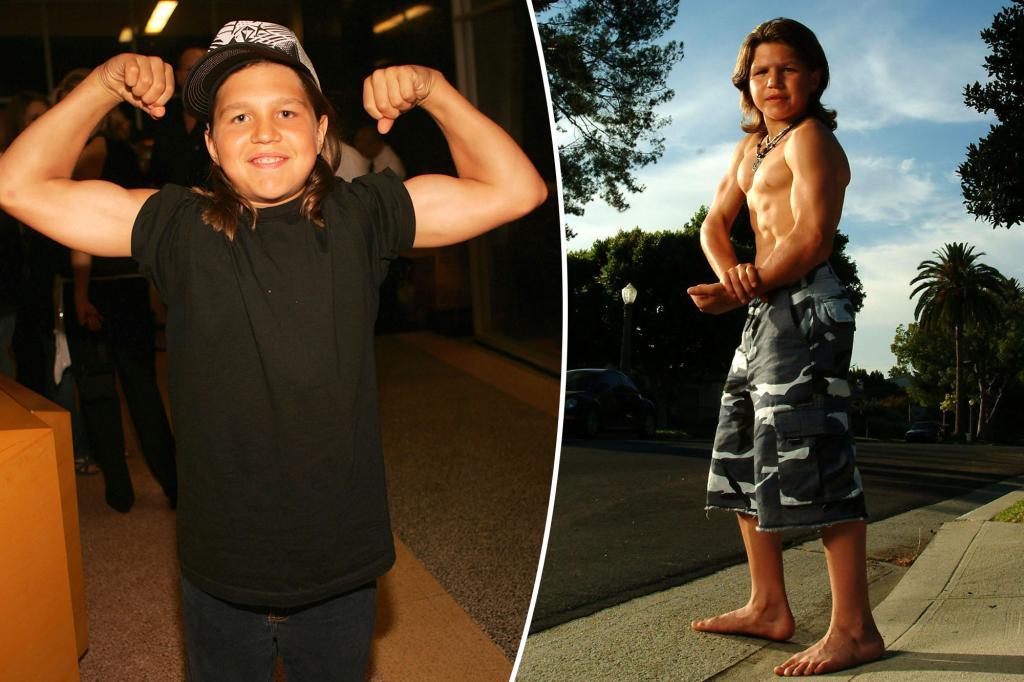World
‘World’s strongest boy’ reveals ‘abusive’ past, 25 years later: ‘I’m looking back at a different person’s life’

The Rise and Fall of "Little Hercules": The Untold Story of Richard Sandrak
Richard Sandrak, once hailed as the “world’s strongest boy” and affectionately known as “Little Hercules,” has opened up about the darker side of his childhood fame in a recent viral interview. Now 32, Sandrak shared how his early years as a child bodybuilding sensation were marked by physical and emotional abuse, leaving lasting scars on his life. His story is one of resilience, redemption, and the struggle to find normalcy after a childhood that was anything but ordinary.
A Childhood Marked by Abuse and Pressure
Sandrak’s journey began in Ukraine, where he was born to a martial arts world champion father and an aerobics-star mother. His parents’ athletic backgrounds seemed to destine him for greatness, and by the age of 5, he was already training daily. By 8, he could bench press three times his body weight and had a physique that seemed almost superhuman. However, behind the headlines and admiration, Sandrak’s childhood was a nightmare. His father, Pavel Sandrak, was both his trainer and abuser, subjecting him to grueling 8-hour workout sessions and enraged fits that turned simple training into what Richard describes as “hostage situations.”
The 2005 documentary The World’s Strongest Boy offered a glimpse into Richard’s reality, showcasing his rigid training regime and diet that deprived him of a normal childhood. His body fat levels were dangerously low, and his mental health suffered under the constant pressure and abuse. Richard revealed that he never chose bodybuilding; he was “physically beaten into it,” forced to endure relentless training and conditioning that left him with emotional scars. His father’s control was so absolute that Richard learned to suppress his pain and continue, fearing the consequences of resistance.
From Fame to Freedom: A Turning Point
Despite the abuse, Sandrak’s talent propelled him to global fame. He rubbed shoulders with legends like Arnold Schwarzenegger and Lou Ferrigno, appeared on TV shows like Jimmy Kimmel Live! and The Howard Stern Show, and even landed a role in the film Tiny Tarzan. However, his father’s violence eventually caught up with him. In 2003, Pavel Sandrak was jailed and deported to Ukraine after a violent assault on Richard’s mother, Lena. This marked a turning point for the teenager, who was finally free to break away from the toxic environment that had dominated his life.
At 16, Sandrak made the bold decision to step away from weightlifting, a decision that was both liberating and necessary for his mental health. He described the sport as triggering PTSD-like feelings, as it was inextricably linked to the trauma of his past. Instead, he turned to other activities like gymnastics, swimming, diving, basketball, and skateboarding, finding joy in sports that didn’t center on his physique. This shift allowed him to reconnect with his childhood and discover new passions.
Finding Normalcy and Overcoming Struggles
However, the scars of Sandrak’s upbringing ran deep. After years of isolation and abuse, he struggled to connect with peers and navigate social situations. He turned to alcohol, a habit he had first been exposed to at the age of 9, and eventually found himself drinking a bottle of tequila a day at his lowest point. Hitting rock bottom became a wake-up call, and Sandrak has now been sober for a year, a testament to his determination to rebuild his life.
Today, Sandrak lives a quiet life in Los Angeles as a retail manager, far removed from the spotlight that once defined him. He resides with his lawyer girlfriend and two cats, Miko and Mushu, and is considering a new career as a personal trainer and nutritionist. While he has not completely severed ties with fitness, he has found a healthier relationship with it, one that no longer revolves around the pressure and pain of his past.
Reflections on a Life Reclaimed
Looking back on his journey, Sandrak reflects on how disconnected he feels from the life he once lived. “When I look back at all I’ve been through, it feels like I’m looking back at a different person’s life,” he said. While he acknowledges the challenges he faced, he is largely content with the person he has become. Sandrak has not seen his father since his deportation and harbors no desire to reconnect, though he remains open to forgiveness. “I may be willing to forgive,” he said, “but I will never forget.”
Richard Sandrak’s story is one of survival, resilience, and the slow, painful process of healing. It serves as a stark reminder of the darker side of fame and the importance of protecting the well-being of children. While his journey has not been easy, Sandrak’s ability to reclaim his life and find happiness on his own terms is a powerful testament to the human spirit’s capacity for growth and redemption.











